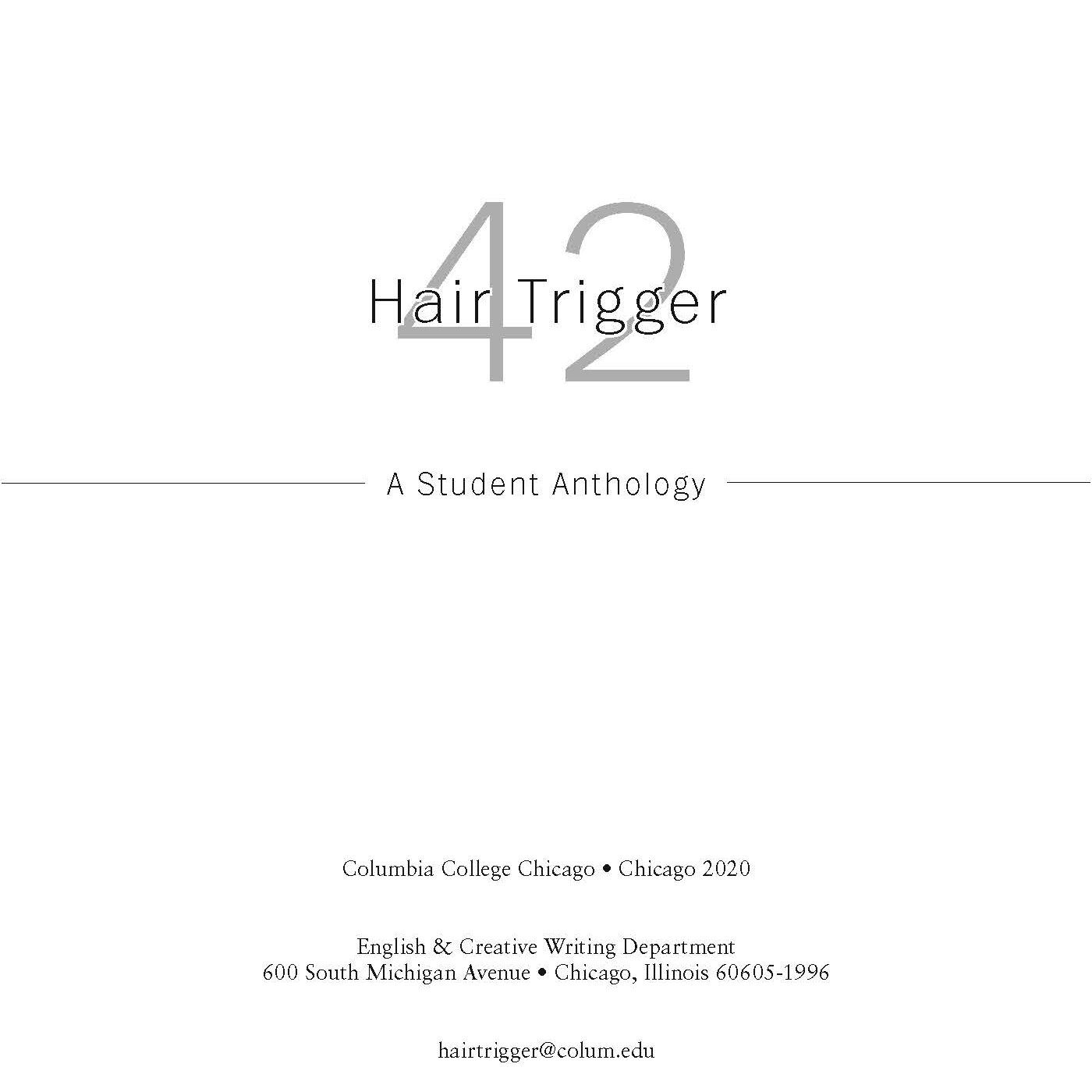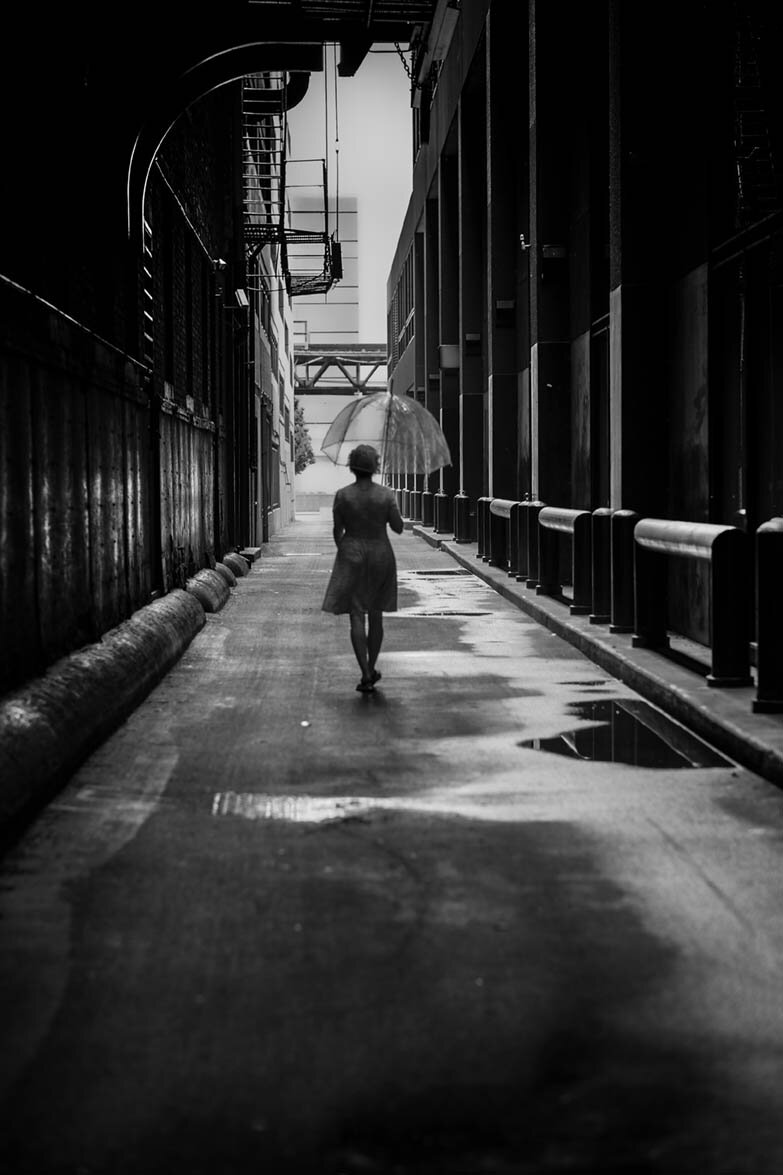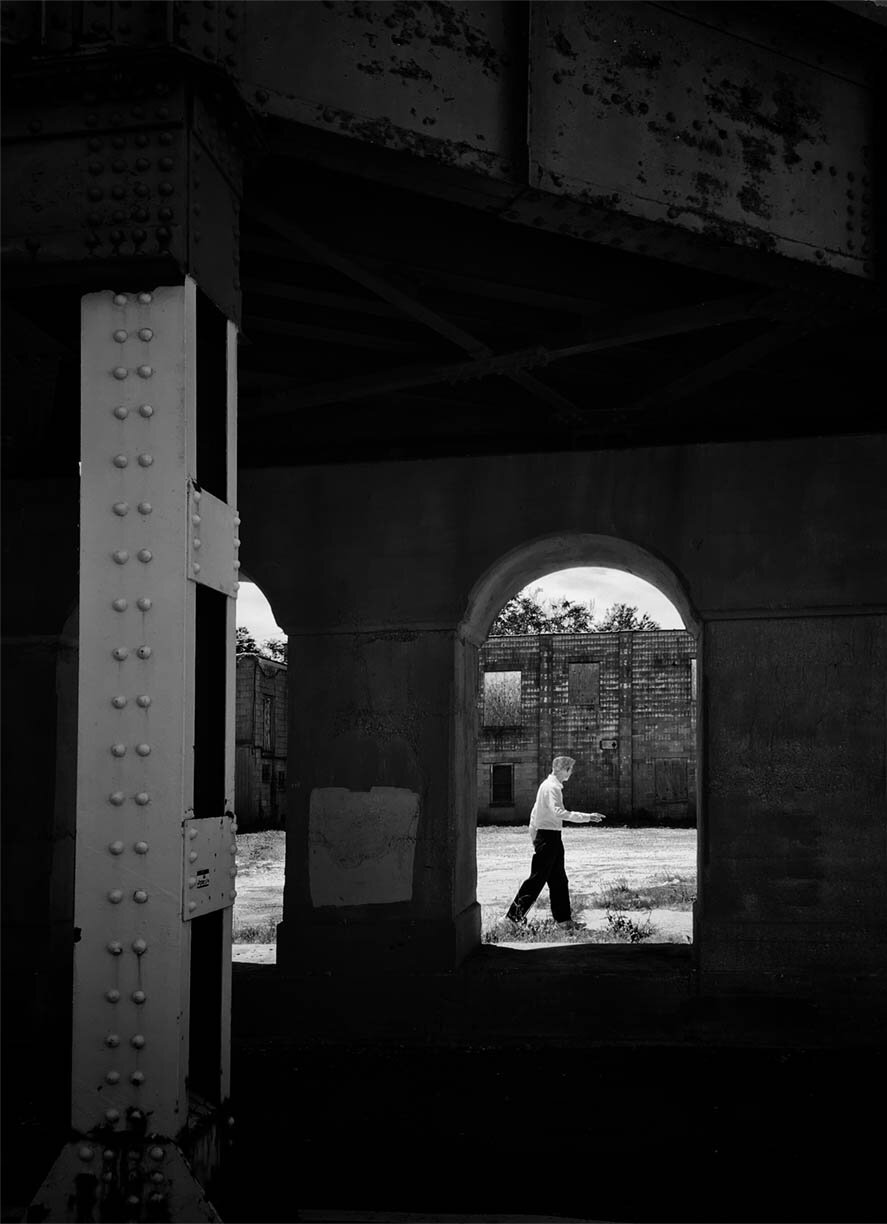Backwoods
Jay’s got his rough and calloused left hand wrapped around my throat, shoving me into the wall. There ain’t much air left in me as my muscles curl under his grip. His right forearm with the winding snake tattoo cracks my sternum. Ma’s behind him, clawing at his dirty t-shirt, using all of her five-foot three-inch body, trying to pull him off me. He’s spitting curses into my face, his hot whiskey breath stinging my nose. He squeezes my throat and our cramped, musty living room behind him starts to blur. I hit the floor and hear a thud. Slowly, feeling comes back to my body, limb by limb, aching like hell. I look up to see Jay holding his nose with blood spurting out.
I know it wasn’t me that hit him. That’s when I see Ma rubbing her knuckles with a panicked look in her eye. Not one of us say a damn word for a good while. Ma’s never hit Jay like that—I didn’t know she had it in her. She backs away, trembling with fear and keeping a close eye on Jay. I pull myself up off the kitchen floor, steadying myself on the dining table, and stagger toward my bedroom. I’m shaking, each muscle sore and vibrating with anger. The front room of our apartment feels like it’s closing in on me.
“Get your stuff, you’re outta here.” Jay slurs, wiping his bloody nose on a dish towel, the dull fluorescent overhead light bouncing off his shaved head. I can’t think of a damn thing to say, my fists balled so tight that my nails dig into my skin. “You heard me, now get the hell out of my apartment.” Ma’s stone silent with her arms crossed, just staring at the ground, like she got nothing to do with it—all of a sudden it ain’t her problem. I bite my lip so hard I taste metal—then everything is hurled out of me again. I storm back to him, anger fueling each piece of my body. The palms of my hands slam against his chest, jolting him back.
“This is Ma’s apartment. If anyone needs to go, it’s you.”
He yanks me up by my collar. His fist grinds into my already raw Adam’s apple. My toes just barely drag on the floor. The muscles in his face are tense, his skin sweaty with hate.
“Listen here, boy, I’ve been around for two solid years now. Kept the bills paid and your ma happy, and I don’t give one damn if you don’t like it. Last thing we need is a drug-addict dropout taking up space.” He throws me down. My spine slams against the tile. Ma sobs in the background. Jay takes three heavy steps toward me. He lifts one dirt-caked work boot and drops it down on my chest. “Don’t you ever talk to me like that again.” He presses his foot into my chest further, and my ribs crunch. He gives me one last red-hot snarl, his nose crusts up with blood. He slowly takes his weight off me and turns to the refrigerator to grab another beer. I scrape myself up again, my entire body pulsing with pain. My eyes burn at Jay’s back. I’m so sick of this jackass. I think ’bout grabbing that bottle and smashing it over his bare skull.
But Ma finally breaks her silence. “Baby, maybe he’s right.” She stands up from her spot on the couch, where she’s been slinking away like a hurt animal. She holds her tears back in, wiping at her blotchy face. Her dirty blonde hair is piled up on her head. She looks tired. She takes both my hands and rubs her thumb up and down, hoping to calm me down. She won’t even look at me—just got her wet eyelashes gazing down as her thumb traces my skin. “Maybe you should take some time away. You’re growing up now, you’re almost eighteen. You need to get away from all this.” She feels guilty, but that ain’t enough. I’m so mad and so damn confused I can barely see, but it’s like the rage doesn’t have any more fight left—so I just stand there with this rumbling hate and listen to her. “You can go stay with Grandma, get some peace and quiet in the country.”
I yank my hands away from hers. “Ma, you telling me to move to South Carolina and live in Grandma’s double wide? The hell do you think that’s gonna help?” Ma wipes her tears, turns away, and lights a cigarette. The apartment seems very small, more sunken in on itself than it ever. The drywall in the kitchen is cracked and there’s blood on the tile. Jay plops down in his recliner in front of the TV and sighs like he knows it’s all over. My gut thumps with unease.
I stare at Ma, noting every sign of seriousness on her face. Her thin plucked eyebrows are stressed into straight lines, eyes deep and sad. She glances over at Jay, nervous as she flicks her cigarette. She steps into the back hallway and nods me over so that we’re just out of view from Jay. Ma talks real low. “Baby, you can’t stay here—it’s not good for any of us. You’re doing drugs, getting in fights, and failing classes. I didn’t raise you like that. You got a good heart, better than most of us. You’re gonna do real good, I know it. But, I’m not gonna let you you’re your life away. Sarasota seems to be turning you rough. A new place would be good for ya.”
There’s a hint of doubt to everything she’s saying, but I know there ain’t no changing her mind. If Jay’s behind it, then it’s sure as hell happening. Ma trying to be nice is just making me angrier. My breaths are shallow, whipping and rattling against my bruising ribs. “You just want me gone, admit it. You don’t care about the dope or the grades; you’re just tired of me. I’ll pack my stuff right now and leave. But don’t you fucking call me when Jay goes too far next time and swings at you. You know damn well he’s gotten close enough.” My words fall hard and cold into the space. Ma looks defeated, her lips curling into a whimper.
I’m packed up in an hour. Ma comes to my room, hands over directions to Grandma’s, and tries to force some mushy goodbye, but I don’t want to hear it. As I leave, I see Jay slumped in front of the TV. Ma stands behind him, rubbing his shoulders, as if he was just on the receiving end of a chokehold. I slam the front door behind me. There’s so much racing through my mind that I feel like I can’t get out of town fast enough. I toss my last duffel bag into my truck. The lady from across the hall is outside, yelling on her phone, probably to her roommate who sells dope and oxy out of their apartment. She must’ve heard the whole fight, ’cause instead of ignoring me like usual, she pauses, holds the phone away from her and shouts, “Take care, kid.”
I got my tan pickup truck from Ma’s old boyfriend, Rick, who was a little less of an ass than Jay. It’s a piece of shit but it drives. I roll down the windows to smell the salty air of Sarasota one last time. As I drive further Florida, the salt fades away and I’m left with the throbbing pain in my throat and chest. The dank scent of swamp and farmland leak into the truck, and I think of the friends that I’m leaving behind. I think of the hours we spent driving up and down the beachfront, leaning our torsos out the windows, hair and baggy band t-shirts blowing in the wind, the salt breeze and crashing waves yelling back at us. I should’ve gone and said bye to Grant, at least. We’ve known each other since we were ten, lived two blocks from each other, and spent all our time getting into shit just ’cause we could. Our group of friends always hung around, never did much, but never anything good. Not one of us ever thought we’d be leaving town. Now here I am, kicked out on my ass, beat up by Ma’s boyfriend, about to spend my senior year in some nowhere, nothing town.
If my dad were around, could I be driving to his house right now instead of Grandma’s? When I was eleven, Ma finally told me he was in prison, and I started writing letters to him. She never would tell me where he was, or how he ended up there in the first place, so I kept all the letters in a shoebox. It doesn’t make much sense to write to someone I’ve never met, but sometimes it’s all I can do when things start going to shit. My first fight, the screaming matches with Jay, all my questions about love and anger—it’s all in the letters. Sometimes it just feels like my dad is the one I should be talking to. Ma usually cries when things get bad and Jay ain’t anyone to confide in. I try adjusting the radio so I can listen to something other than my spiraling. But there’s only static and a late-night preacher. Everything happened so quickly tonight, and I can’t help but get stuck on how. By the end, Ma was sulking back to Jay like always. The morning sun is poking out on the horizon, and I got hours left of driving, telling myself that leaving is good for me somehow.
I pull into the dirt road of Grandma’s trailer park around 12:00 p.m. the next day. I spot her trailer right away from the tacky plastic animal lawn ornaments she sold while she lived in Florida. The flamingos, tigers, and fish crowd the patch of grass that make up her yard. I haven’t seen Grandma in years. She moved back to South Carolina when I was three or so, and Ma has only brought me to visit once. From what I can tell, they don’t like each other too much. Or at least don’t care to see each other. I hear Grandma’s a hard-ass, especially to Ma, but hell, ain’t everyone a hard-ass compared to Ma?
I get out of my truck, stiff from sitting down for ten hours. Before I’m even on the little add-on wooden porch of the trailer, the door opens. Grandma stands there, barely taking up the doorway. She has her blonde, graying hair twisted back in a knot, a thin flannel tucked into jeans, finished off with hiking boots. Her hound dog pushes out from inside, sniffing all around me, and starts to growl. Grandma is only fifty-six and she has the same high cheekbones and rounded face as Ma. She looks at me carefully, her small features and wrinkles form a stern look. Her eyebrows raise as she lingers on my neck, and I know she’s looking at the bruise from Jay. “Well, look at you. Your Ma said I’d be expecting you this week, but you sure as hell didn’t waste your time. Don’t mind Rufus, he’s getting arthritis, so he won’t do much harm.” She waves me into the trailer.
Inside it smells like saltines and gun smoke. Two rifles sit up on the wall that’s covered in cheap floral wallpaper. “Now let me give you the tour. My room, your room, kitchen, bathroom, living room.” Her finger follows her words in a quick circle, and she wheezes at her own joke. “We can talk tomorrow, go get settled in. I got my shows to watch. And remind me to teach you how to use a damn washing machine.” She wheezes again. I look down and realize Jay’s damn boot left a dirty shoe print on my shirt. I shake my head but smile for her anyway.
“Yes, ma’am.”
I drop my two bags on the floor of the spare bedroom, fall down onto the bed, not bothering to get under the thin quilt, and pass out looking at the beige, gloss-finished wall.
My eyes shoot open to the sound of banging. The door swings open and Grandma walks right in, hollering for me to get up. The alarm clock reads 6:30 a.m. Grandma pulls open the blinds, letting the cold morning light in. “Come on, we got a lot to do today!” I get dressed as quick as I can. I go to the bathroom and splash cold water on my face. I take a good look at myself in the mirror. Feels like I haven’t seen myself in years. The blue and gray bruises on my neck from Jay’s chokehold are twice as dark as they were yesterday. I look like hell with my hair lying flat from sleep, and gray, heavy circles under my eye. I pull my white t-shirt back to cover my bruises, so no one starts asking questions.
When I get outside, Grandma is already in her Honda, putting on brown sunglasses and driving gloves. She adjusts the strawberry tree air freshener hanging on the mirror. “Oh good, you’re done primping.”
As Grandma drives us through town toward the high school, we pass acres of farmland and strips of sad, broken shacks. The past two days have left my head buzzing. I know my friends are gonna give me hell for living in the country, not that any of us had nicer plans. I already miss the beach. This side of the state is landlocked, and it makes my breathing shallow to think about it.
Soon as we check in at school, a woman in a sweater vest hands over the paperwork and smiles wide. “Jessie! I spoke to your mom a few weeks ago, and we’re excited to have you join us next week when the fall semester begins!” I start getting mad. I tap my foot and my knuckles tense to white. This wasn’t just some snap decision ’cause Jay felt like it; this whole damn thing has been in the works. Anger starts brewing inside me, like the whole ocean is churning in my stomach and veins.
Grandma leans over and whispers, “Boy, you better pull yourself together.” I’m not less mad, but I close it off somehow. Grandma kinda scares me. I’ve heard stories of how she used to chase off Ma’s old boyfriends with her shotgun. I wonder what she thinks of Jay. I’ll bet she’d have no problem pointing that gun at him.
Every piece of Pickens that I’ve seen while driving around looks like a back road, like a shortcut through the shitty part of town. All of it overgrown and unused. Grandma pulls up to this car shop on the other side of town. She doesn’t bother to park, just pulls her Honda across parking spots, in front of the gray garage with a small, glass room attached. A red, rusted sign hangs over the building and reads: Pickens Car Repair. “Go ask for Hurley—he’s got a job for you.”
“I don’t know anything about cars, though.”
“Well, you’re gonna learn. Listen, this is how this is all gonna work. You’re gonna live at my trailer and you’re gonna go to school. You’re gonna pass your classes, you’re gonna work at the shop with Hurley, and you’re not gonna screw around. Now get out of my damn car so I can get back to Rufus and the wrestling match.”
I want to argue, but I see right into that hard expression and I know she ain’t bluffing. I guess I expected all this. And I ain’t worried about school, never had much trouble doing the work; I just didn’t want to. I feel a little sick with all the change. But I know sitting here won’t help nothing. I get out of the car and walk over to the faded glass doors.
Hurley’s a small, squat guy who always wears gray coveralls and has a flushed tone to his face. Somehow he looks goofy and tired in the same breath, like a Christmas elf serving a life sentence. I work at the shop on the weekends. When I get in, he’s at his desk doing paperwork, drinking instant coffee with his feet propped up on the metal desk. He likes calling me James Dean. He teaches me a new part of a car every day. Pretty quickly I can change AC belts, brakes, and tires. While we work, he wipes the grease off his forehead with his red bandana and tells me town gossip. He’ll ask about school and I tell him the truth—I just do the work, stay quiet, and the teachers don’t mind me at all. I don’t tell him that I feel restless all the time, miss my friends, and wish there was something less sad looking about this town.
In October, this new family moves into the trailer just down the slope from us. From what I can tell, it’s a dad, a kid my age, and his little sister. They seem real down on their luck, but hell, ain’t everyone in a trailer park? The dad is this real big guy, round beer gut, rough around the edges with a red face. The girl looks about five or six, energetic, and runs around in circles in the yard. They live in an old, faded trailer right by the creek bed, where the kudzu vines hang over the trees. Within the first week, I hear the dad holler real harsh at the kid and his sister. I bite my lip, drive off toward work, and keep out of it. But I keep thinking about the hollering and how it sounded whiskey-infused, just like Jay. Most of all, I think about how I didn’t hear anyone yell back.
A few weeks go by, and one day I see the kid walking toward the school bus stop, and I don’t know what gets into me, but I slow down and roll down the window.
“Hey, you headed to Pickens High?” He’s got his hands in his pockets, clothes hanging off his bones. His eyebrows furrow while he gives me a skeptical eye over. “Don’t worry man, I’m not some creep, I’m headed there too. Figure you might not wanna take the bus.” He loosens up and laughs a bit.
“Yeah, alright, thanks. I’m Logan.”
“Jessie.” He walks around the front of my truck to get in. We drive off toward school making small talk. Turns out, that’s his uncle Ben and his cousin Leslie. They moved here from Tennessee after some money problems. His parents ain’t around anymore. He doesn’t go into much detail. By the time we’re at school, we’re talking about music and movies. Other than the few times Grant’s called, I haven’t talked to another teenager like this since I moved.
I start driving us to and from school, and we hang out a few nights a week. I can finally relax and have someone to kill time with. I ain’t just waiting for the next class or shift or meal. Logan’s calmer than my friends in Sarasota; he doesn’t mind sitting in the quiet for a long time. He’s got this light blond hair that falls into his face that he twirls at constantly. There ain’t much to miss out on in Pickens, so we spend our time at my place or sitting in the lawn chairs outside. Logan says his place ain’t too hospitable, and I don’t ask what he means, ’cause I’m sure it’s gotta do with his uncle Ben. Trailer parks are strange like that, the engineering doesn’t keep sound in too well, so most of the time you can hear everyone’s business, but you just pretend you don’t know a thing.
It gets to a real hot day in early November. I make my way toward my truck in the student parking lot. Logan is home with some flu and I’m heading off to work, already making a list of things to do. Karl, a loud, patriotic jackass with cut-off sleeves and camo pants starts hollering at me.
“Hey, you ain’t deaf, are ya?” I try to swallow my frustration as I hear him walk up behind me. He yanks me back by my backpack and I spin around to face him. His Mountain Dew and chewing tobacco breath smacks me right in the face. “Aw, looks like you finally got some balls.” He takes a finger and pushes hard at my chest. My chest stiffens, like Jay’s boot is right back on it. “Guess the Florida boy ain’t shit then.”
As I pull my fist back to swing, a familiar feeling rushes in. This is just like any fight at South Sarasota High. Once I hit him, I clock him again. When I fight, the first punch breaks something open in me; the rage built up from all the bullshit floods out and becomes uncontrollable. This wave of sickening, relentless rage overcomes me from everywhere at once. Back in Sarasota, my buddy Grant would be by my side. Once we got to high school, there was always some anger hanging inside us. The fights weren’t serious—just dumb kids stealing a wallet or yelling nonsense at us. But we’d be in it together—Grant swinging at the other kid, getting out whatever frustration he needed to. And he’d always be ready to pull me back when I got too mad and couldn’t stop. Right now, I’m alone with my anger. The sun beats down in the lot and my rage surges through me as my knuckles crack against Karl’s ribs. The anger has washed over me and nothing else matters. Karl hasn’t gotten in one hit. He starts looking smaller and smaller. I grow tired in the heat but keep swinging. His friend with the empty gun holster slides in and pops me in the eye. I give him a quick punch and both of them slowly back away.
I’m shaking the whole drive to work. I only made it three months at Pickens before getting into some fight. I’m so goddamn mad. First, that Karl even looked twice at me, but really, that I got mad enough to hit him. I look in the mirror to see my eye already bruising up. Now I’ll have to explain it to Hurley. I smack the steering wheel. I feel trapped in the damn truck. I roll down the windows and smell manure. I was expecting to smell the salt water of Sarasota. I get angrier missing the beach. When I finally get to the shop, I’m all worked up. I jump out of my truck and slam the door. I take a deep breath and swallow the hot air and all the rage, and hope somehow it will just disappear, like my stomach acid will just break it all down. Guess that’s what I’m always hoping for—for the anger to shut itself off.
I walk in and Hurley doesn’t miss a damn beat. He glances up from his clipboard, to give me a look over—frowning at my eye. “What in God’s name happened to you?”
“Don’t worry about it.” I try walking past him. He’s at his desk and the low hanging tile ceiling seems closer—bringing the smell of oil and dirt right to my nose.
“Like hell. I know damn well you didn’t do it to yourself. Luanne’s gonna rip you apart.”
“Fine. That dumbass hick Karl, the kid with the American flag on his truck. Well, he pissed me off and I hit him. His friend hit me. That’s all. It’s over with.”
“Sit your skinny ass down.” I inhale sharply, trying to cool the residual anger, and sit down on the folding chair across from Hurley at his desk. He snorts and shakes his head. “Well, Karl is a little shit—but you can’t be swinging at every dumbass in the county. Luanne is gonna come after you like hellfire when she sees your eye. I sure as hell won’t be gettin’ in her way.” He pulls out a bag of almost frozen peas from his mini-fridge. He tosses the bag across the desk and I just barely catch it. I fumble with the plastic bag of peas, slick with wet, cold frost. Hurley nods. “Come on, it ain’t gonna heal itself.”
I slowly press the bag against my burning eye. “You’ve seen her go after somebody before?”
“Boy, I’ve known Luanne since she was in high school. When she met your grandpa, she had a softness about her, but she was still tough as nails. They got married and she found out about his drinking problem real quick. He came from a real tough mining family, ain’t nothing but hate in his childhood. He wasn’t much different. He started getting into fights around town and pushing Luanne around. When your ma came into the picture, Luanne had enough.
“One night, Randy, your grandpa, came home with blood all over him. Stunk of whiskey. He’d gotten blind drunk at the pub and beat this kid within an inch of his life. When Luanne asked what the hell happened, well, he was enraged. Started going at it with her, trying to deck her. They fought back to your ma’s nursery. Randy was belligerent, tried to rip the door off its hinges. Luanne grabbed the rifle and aimed it right at him. When he didn’t stop, she fired a warning shot.” I can see Grandma, under the weight of her rifle, in the middle of chaos. A raging drunk rattling toward her daughter. I wonder if that was the first time she had to use that rifle.
Hurley continues on, “That was the end of that. Luanne called the cops, and he’s still locked up. First off, for beating that kid, then a few years ago, when he beat up someone while on parole. Some just never change. Luanne wasn’t around for his parole; she knew better than to wait around for him. Now, I know all that ’cause I used to live in that same park. But don’t you dare ask her ’bout it. Luanne ain’t screwing around. She’s seen a great deal of angry men in her life and she ain’t afraid to fight back. She’s all into that tough love. But the woman has had enough shit. All that with Randy, then of course what your dad put her through.”
“Wait, what do you mean? You know my dad?” I shift forward.
“Well yeah, your ma and him were high school sweethearts. He didn’t stick around too long after she got pregnant. But that wasn’t his fault—well, not entirely. He had all that rage, just like you. Went around getting mad at nothing, raising hell. Luanne didn’t want that around her daughter in the first place, and she got her way in the end.” Hurley takes a sip of instant coffee.
I adjust the peas. “I never knew anything about him. Just knew he’s in prison. Ma won’t say another word about it.”
“Well, kid, this really ain’t my place. Luanne would kick my ass just for talking ’bout all this. Go on, get to work.” He waves me off and spins his chair around to his filing cabinet.
I sit there in disbelief for a minute. Never thought I’d know much of anything about my dad or grandpa. I have this tight feeling in my gut, like something is about to happen. All that rage, just like you. Hurley’s words are stuck in my mind for the rest of the shift.
When I get home with that big ole black eye Grandma lays into me. She doesn’t yell or cry like Ma would’ve. She just talks harsh and stern, her voice unwavering. She goes on about consequences and restraint. Her face is hard as stone, but I feel a sort of worry in her, like she’s staying quiet about something. She looks me real deep in the eyes. “Listen, Jessie, you ain’t gonna go down this road. I don’t want to see you behind bars—I’m just not doing it again. And I sure as hell ain’t seeing your ma go through it again.”
The mention of Ma brings a wave of frustration. “Ma couldn’t care less, she hasn’t checked on me since I got here.” Grandma’s eyebrows arch at me, and I feel a sliver of regret.
“Jessie. Your ma ain’t heartless, so stop acting like it. She calls me every few weeks, but we all know you don’t wanna talk to her. There’s no need in getting you up in a fuss, so I kept it to myself. She sure ain’t winning the mom-of-the-year award, but she loves you.” Grandma wipes the kitchen counter with a dishcloth. No matter what she says, I know Ma doesn’t wanna talk to me neither. She gave up on me. Grandma stops wiping the counter and looks at me. “You know, all of this anger and these fights, they ain’t all about you. People gotta watch you turn your life to shit.” She doesn’t say anything else, just walks back to her chair and turns on the TV. I stand in the kitchen for a moment, a splintering guilt filling inside me.
I go back to my bed and fall onto my back. The left side of my face and my knuckles burn. I got so many questions about all this, about my dad, and why everyone knows more about him than I do. I think back to what Hurley told me, and how Grandma doesn’t want to see me in jail, even Ma, in her own twisted way worries about it. They all seem like they’ve seen the future, like they know where I’m gonna end up. I feel like I’m falling into a hole with all these thoughts.
I rip a page out of my world history notebook and start writing a letter to my dad. I tell him how I got kicked out, how I live with Grandma now, about working with Hurley, and that today was shit. I start rambling toward the end. “I used to be so worried about what Ma thinks of me, now I know it ain’t going to change. She sees me as a lost cause. I know I don’t have to end up in a cell. But I bet you thought the same thing.” I stop myself before I get too deep in thought. I tell him to take care of himself and seal up the letter, adding it to the shoebox.
As the months go by, Logan and I grow to be real close. He’s one of those people that’s easy to talk to, maybe ’cause we both got our own personal problems to focus on. We don’t get into much trouble. We keep our heads down at school, don’t act up¾just get in and get out.
Sometime in January, we’re sitting out front on the lawn chairs. The sun has just gone down and it’s getting cold for the South. Logan’s been more skittish lately; he’s picking at the skin around his nails. His gaze is glued looking down toward his trailer. Through the blinds, we see Ben chugging a bottle of rum. We’ve been sitting in the quiet so long, I don’t remember what we were talking about. Finally, Logan speaks, “Why’d you get kicked out of your ma’s?”
I’m thrown off by the question. “Uh . . . well, I ain’t really sure. I got in this fight with Ma’s boyfriend one night. She said it was the weed and trouble in school, said ‘change’ would be good for me. But they’d been planning it. Ma had called the school weeks before the fight. I don’t even care what her excuse is. She watched me get beat on and kicked out by her lunatic boyfriend. My guess is Jay’s got more to do with it than anything.”
He keeps his eyes on Ben stumbling back and forth. “What do you mean?”
“He’s just got this way with her, like damn mind control. Even when he’s beating her son and heavy with whiskey, she’ll still come out and defend him. It pisses me the hell off.”
“Yeah, I’ve seen it before.” He clears his throat. “My dad’s a real ‘man of God’ type. Tries to convince everyone he’s violent for a cause. The dude lives for the power of invoking fear.”
His voice is solid, smooth, and there’s almost a smirk on his face. I want to ask him more, but I stop myself. Something about how we’re tucked into our hoodies, leaning back far into the lawn chairs, reminds me of the guys in Sarasota. How we’d lounge around, shit talk each other, and smoke out by the shore. Tonight’s different though. The air here is musty and dense; there’s no wind to release anything. I’m stuck on why Logan is bringing all this up now, but he always has something more serious to say than any of my old friends. He opens his mouth to say something, but Ben comes out and yells for him to get inside. He gets up quick. “I’ll catch you later.” He’s got this sunken look to him as he hurries down the slope. I sit there and a thick twinge of anger and worry starts bubbling up.
I hear the door to Grandma’s open behind me. “Come on now, that ain’t your business. You’re just asking for trouble.” I hesitate, but get up from my chair anyway.
Once we’re inside, she goes back to the kitchen to start dinner. I sit down at the dining table, my jaw clenches as I stare off toward the window, listening to the faint sounds of Ben. Grandma sees my foot tapping and shouts at me from the stove. “Cut it out boy, getting mad for other people ain’t gonna do anyone any good. You know how that turned out for your dad.” I finally stop looking out the window, turn to her, and sit up straight.
“What?”
“Well, that’s what landed him in jail. Your ma never tell ya?”
“She doesn’t like talking about him.”
Grandma thinks for a second. She’s got her lips pursed and she’s shaking her head, annoyed with Ma, I assume. She sits down across from me, settles back in her chair, crosses her arms and looks at me so long it makes me nervous. “Your dad always had this switch in him, you hit that switch and bam¾anger pouring out of him. He met your ma after he got out of juvie for smacking up some teacher. I didn’t like him one bit, he had a bad attitude and a violent way about him. He was always getting mad on your ma’s behalf. Well, when he got your ma pregnant we thought he might be over all his outbursts. But one night, your dad and ma were pulling out of the gas station down on Greenview Road, right at that four-way stop. Some teen was speeding down the road, not paying any attention, and crashed right into your ma’s side of the car. Your dad was livid, he dragged that kid out of his car and beat him until his face was a bloody pulp. The kid died in the hospital that night from a brain injury. The parents had money for lawyers, so your dad got locked up for twenty years.
“Your ma was shattered, losing her wits. I decided we should move to Sarasota. There was no point in sticking around here. She was seven months pregnant. She visited your dad in jail right before we left and told him, through the plexi-glass, that we were moving and he wouldn’t be in your life. Now, I didn’t last too long in Florida. I got you and your ma settled and moved back home. Of course, your ma started right back up again dating men who had tempers. I kept in touch, mostly to check on you. I knew she was stuck in her ways already.”
This is the most I’ve heard of Dad, and there’s an overwhelming darkness to knowing he killed a kid. I hate thinking it. I try to move away from it, but my mind keeps falling back on the blind rage and the brain injury. I don’t know what to say, but I’m not sure when Grandma will feel like sharing again, so I start asking. “Has Dad ever tried to find us?”
“It doesn’t matter, hon. He ain’t worth the trouble. If he did, he’d probably just be trying to make selfish amends, healing his own guilt.”
“So, you know where he is?”
“Yep. But like I said, you don’t need to know. There’s no good in finding him. Listen, just keep your head down. If you got a temper, best thing to do is stay out of the way.”
I go back to my room and pace around. I think back to everything Grandma told me. I see Ma going to visit Dad in jail before we moved. Her wearing her pink yoga pants and flip-flops. She sits down in front of him, already crying. I bet the fluorescent lighting of the visiting room is bothering her. Dad, on the other side of the plexi-glass, trying to be sweet and careful. I see him the only way I know him. From the only picture I’ve seen, as a seventeen-year-old at the state fair with Ma. I see him young, blond stubble poking out, just like mine. The orange jumpsuit swallowing him. I bet Ma blamed it all on Grandma, bet she told Dad she didn’t have a choice. When she tells him, he slams his fist. His eyes tear up while he yells. The anger overflowing.
I get out a piece of paper and start writing to Dad. But this ain’t the regular catching up talk. This time I ask questions. I ask him about Ma, if he loved her. I ask if he’s ever tried to contact me. And if he ever figured out how to control the rage. I write so fast my hand cramps. I just keep going until I’m done.
A week goes by and the letters are still sitting on my bedside table. It’s an oddly breezy night, as if the waves are so big off the coast that they’re blowing all the way across the state and into low-lying Pickens. I go outside to meet Logan. I stand on my side of the dirt drive with my hands tucked into my pockets. Trees rustle overhead and shadows reach across the dark sky, the porchlamps leaving the only light for the moths to flail around. I look at Logan’s trailer sunken down the hill, waiting on him to walk out. Instead, I hear crashing and Ben’s slurred hollering. I step closer until I’m just a couple yards away. I watch through the blinds in the living room as he’s thrashing after Logan, who’s carrying Leslie. My chest tightens as they disappear from view. For a moment, I can’t hear much of anything. I gulp down the quiet air and it lands heavy in my gut.
Then Leslie’s sharp scream comes out of the trailer, slicing the air. The whole world is deathly still for a moment. A surge of blind energy takes me right up to their front step. But before my hand reaches the door handle, it opens and Logan comes out from Ben’s thrashing grip. He tumbles into the yard, his body kicks up dirt as he lands on his side.
Neither of them pay any attention to me. Logan picks himself up quick and I get a glimpse of his face and know something ain’t right. His face is cold and fixed on Ben, a red-hot glare coming through his eyes. I’ve never seen that look on him. Ben starts hollering again, his lips loose and skin flushed. “See, you ain’t got a damn strong bone in your body. No wonder your dad lost his goddamn mind and dropped you off with me.”
I see Logan’s jaw tremble with hate and a wall of energy builds up through him, and charges Ben, smashing him into the side of the trailer. I step back, I can see the relief falling out of Logan, but the hate in his eyes is radiating. After another hit, Ben’s on the ground, sluggish with liquor, just barely shouting curses. Logan shifts his weight back and goes to kick Ben in the gut. I recognize each move of his muscle, the rage coursing through his leg as his foot cracks at Ben. Each collision another discharge, and the adrenaline cycling and recycling into an uncontrollable storm. The cold white of Logan’s skin tells me he doesn’t feel it anymore, his mind has disconnected from everything. Ben lies on the dirt sputtering. Logan contracts, ready for another kick, and I get a real good look at him. His eyes reflect the yellows of the porch light. He looks real young, fresh-faced, just like my dad at the state fair.
I snap into action and push Logan back into the yard.
“Hey! Cool it.” I grip him by the shoulders, holding him in place. I feel his bones fighting against me as he thrashes toward Ben. Each push and jolt grows weaker. Slowly, he loses momentum and every rigid muscle melts. A familiar calm creeps back into his eyes. He finally looks at me and I watch the anger recede back into himself. His shoulders drop, and he steps back from me, faintly shaking his head. He seems like he’s about to explain himself, but he doesn’t need to, I been there too many times to count. “You good?”
“Yeah, uhm . . . I . . . I don’t know what happened, I just¾I couldn’t take it anymore.”
“I know, but you can’t beat it out of him.” We stand there in silence in the sloped yard, looking at Ben who hasn’t bothered to get up. He looks sad and weak down on the ground.
“I gotta go check on Leslie.” Logan walks to his door, but before he disappears into the trailer he turns back to me, “Thank you.” I give him a half smile.
There’s a warm, calm buzz through my body as I walk up to my trailer. Grandma is standing in the living room, blinds pulled back, with a softness in her face. “You did good, hon.” I nod and start toward my room, but she hands over a piece of paper. On it reads the address of a South Carolina state prison. She looks at me with watery eyes and walks off to her bedroom.
The next morning, I comb my hair back to get a good look at my jawline and I wonder if I look like my dad. I sit down and write to him again.
Last night, I watched my friend nearly beat the life out of his uncle. This kid, who I’ve not once seen angry, turned red with hate. And I knew it wasn’t right, Logan wasn’t gonna do anyone any good by fighting. So, I held him back and I felt the rage leave him. For once, I felt like I did something about the anger, even if it wasn’t my own. Recently, I stopped picturing you in a jumpsuit. I think of you, with Ma, at the state fair with that real honest, crooked smile, and I see a piece of myself. I know there’s a better side to all of this.
I seal up the letter and put it with the rest. I call Hurley and let him know I’m gonna be fifteen minutes late. I leave and take the shoebox with me.
___________________________
Natalie Benson-Greer lives in Chicago and is an undergraduate student studying fiction at Columbia College Chicago. “Backwoods” is her first published work.










